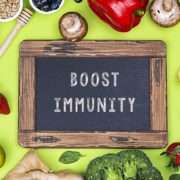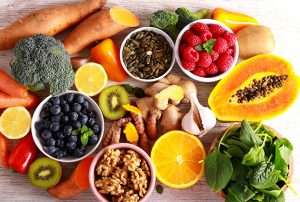5 TIPS TO START WITH A PLANT- BASED DIET

Plant-based eating primarily focuses on foods obtained from plants. This brings to the plate not just fruits and vegetables but also nuts, seeds, oils, legumes, whole grains and beans.
Choosing a plant-based diet is definitely a way to a healthier life. In fact it is our natural tendency to want to eat any colourful, luscious veggies at sight.
There might be many arguments about which diet is best for you.
But health and wellness communities unanimously agree that diets emphasizing on fresh and whole ingredients and minimally processed foods are the best for maintaining overall wellness.
Plant-based and whole-food diets are known to deliver just that.
What is a plant-based diet?

Whole food, plant-based diet is more of a lifestyle and so there is no clear demarcation line as to what constitutes a WFPB diet.
This is because consumption of plant-based diet can vary greatly depending on the extent to which a person adds animal products in their diet.
Despite that, few basic principles of a whole-food, plant-based diet is as follows:
- Emphasis is on whole and minimally processed foods.
- No animal product included
- Focus is on plants, vegetables, fruits, whole grains, legumes, nuts and seeds which should make up most of what you eat.
- Refined foods like white flour, added sugar and processed oils are eliminated.
- Food quality is maintained to be superior with focus being on organic or locally sourced food.
Vegan or vegetarian diets are different from WFPB diets. This is so because people who follow vegan diets abstain from consuming any animal products, including dairy, poultry, meat, eggs, honey or seafood. Some vegetarians might resort to eating eggs, dairy and seafood also.
The whole-food, plant-based diet is comparatively more flexible. Most follows eat plants but animal products aren’t off limit as well.
Benefits of a vegetarian plant-based diet

Plant-based diets are often higher in fiber and phytonutrients and provide all the necessary protein, fats, carbohydrates, vitamins, and minerals for optimal health.
1. Helps in Weight Loss
The high fiber content along with the exclusion of processed foods is the key to shedding those extra kilos.
A review of 12 studies of more than 1,100 people found that those who consumed plant based diet significantly lost more weight – about 2 kg over a period of 18 weeks – as compared to those who consumed non-vegetarian diets.
Adopting a healthy plant-based diet is also beneficial to keep weight off in the long run.
Cutting down on processed foods like soda, candy, refined grains and fast food itself is a powerful weight loss tool.
2. Prevents Cognitive Decline
Studies have shown that diets rich in vegetables and fruits helps to slow down or prevent cognitive decline. It is also known to be effective in Alzheimer’s disease.
The credit can be contributed to a higher number of plant compounds and antioxidants, which have been proven to slow the progression of Alzheimer’s disease and reverse cognitive deficits. This is one of the prominent benefits of a plant-based diet.
Therefore, it is advisable to increase the consumption of fruits and vegetables in order to reduce cognitive decline
3. It’s Good For The Planet
Plant-based diet followers have smaller environmental footprints.
A sustainable eating habit would eventually reduce greenhouse gas emission, water consumption and land used for factory farming. All of which contribute to environmental degradation and global warming.
Additionally, less dependence on animal products will help boost local economy and reduce dependence on factory farming.
Top 5 Tips to get started with a plant-based diet

1. Choose good fats:
Olive oil, seeds, nuts and nut butters, avocados are healthy choices to start with.
2. Include whole grains for breakfast:
You can have oatmeal, quinoa, barley or cornflakes to start your day and then add some nuts or seeds along with fresh fruits.
3. Build a meal around a salad:
Add an assortment of colourful vegetables along with fresh, beans, peas, or tofu with fresh herbs. Fill your bowl with greens like spinach, lettuce, cherry tomatoes and likewise.
4. Eat lots of vegetables:
Think more in terms of the good amount of fiber that you’ll be passing through your gut. Make sure to eat half a plate of veggies at lunch and dinner. Add in toppings of hummus, salsa or guacamole to make it more appetizing.
5. Eat fruit for dessert:
A sweet crunchy bite of an apple or a refreshing slice of ripe and juicy watermelon as a replacement to your usual dessert should be enough to satisfy your sweet cravings after a meal.
Inspiration for eating plant-based food throughout the day
Here are some ideas to imbibe plant-based eating into your lifestyle. Over time, this will become second nature.
Breakfast:
- 1 sliced banana + oatmeal + greens + frozen mixed berries
- Whole-grain pancakes + applesauce/ honey + frozen blueberries/ strawberries
- Rolled oats with walnuts + banana slices + sprinkle of cinnamon.
Lunch:
- Tomato basil soup + whole-grain crackers + an apple.
- Two ‘makai ki rotis’ + one bowl of beetroot cucumber raita + one serving of sarson ka saag
Dinner:
- Vegetarian pizza topped with mozzarella cheese + tomatoes + onions+ broccoli + peppers, and mushroom. Fresh strawberries for dessert.
- Rice noodles + frozen peas + topped with cherry tomatoes + teriyaki dressing
- Mix veg pulav + pineapple raita














